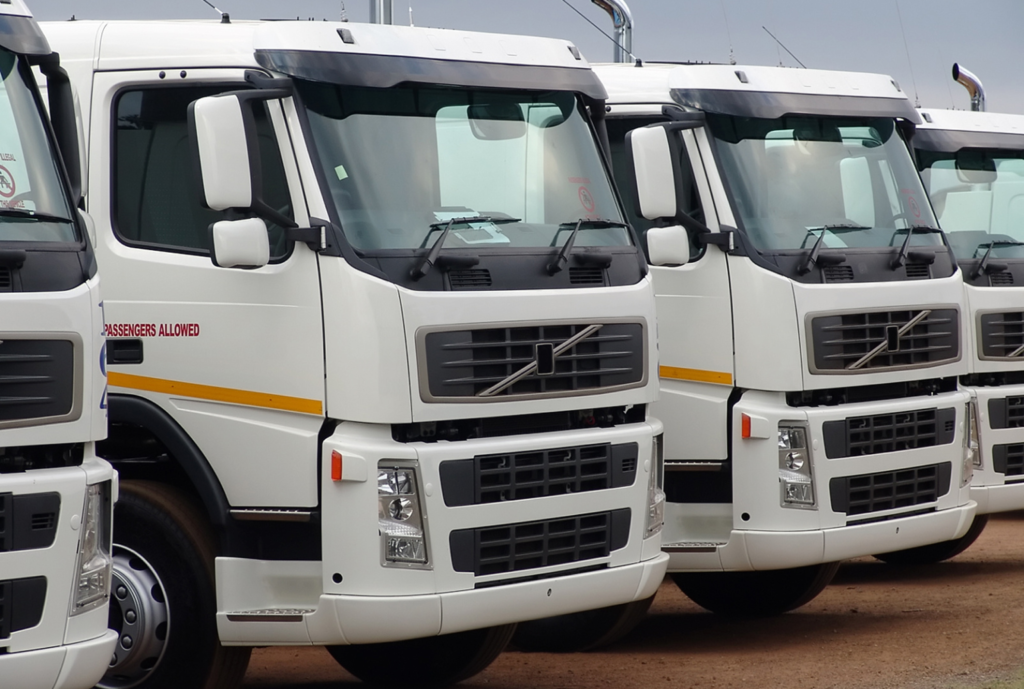When your company needs to transport truckloads of freight, you have several alternatives on how and where to get (truck and driver) capacity.
You can divide the U.S. truckload market into two main categories – private fleets and for-hire carriers.
The main difference? Its ownership and driver’s employer.
In this post, we’ll focus on private fleets: what it’s about, why shippers use them, their pros and cons, and more.
What Is A Private Fleet?
A shipper’s private fleet is an internal group of trucks that it utilizes to deliver its own products to storage facilities, shops, and clients.
The National Private Truck Council (NPTC), a national trade organization specifically for private motor carrier fleets, states that private fleets are run by businesses “whose principal business, such as manufacturing or retailing, is not trucking.”
Shippers with private fleets typically own their vehicles (tractors, trailers, etc.) and hire their own drivers.
However, shippers can also rent or lease their equipment and use temporary drivers because private fleets offer a range of business models.
Regardless, the operation is regarded as a private fleet as long as the shipper is in charge of the transportation (rather than contracting out the tools and labor to a different party).
Some examples of companies with a private fleet are Walmart, Tyson Foods, Haliburton, Sysco, and PepsiCo.
What Is A Private Fleet Driver?
A fleet driver operates a car, truck, or another vehicle for a transportation business. You may work as a fleet driver for a private corporation that runs a fleet of vehicles for charter use, or you could work in an area where you interact with the public, like taxi driving or ride-sharing.
The pick-up and delivery of customers is your main responsibility. As a private fleet driver, you need to have the ability to follow directions, great driving skills, and previous customer service experience. For some companies, a spotless driving record and a commercial driver’s license are required.
How To Become A Fleet Driver?
Good driving abilities, a current driver’s license, a spotless driving record, and prior customer service experience are the main requirements for becoming a fleet driver.
Depending on the job, some trucking firms may want a high school graduation or its equivalent, while certain states demand a commercial driver’s license (CDL) or to get a Department of Transportation (DOT) certification.
Employers that manage fleets of vehicles for charter use, such as taxicab firms, ride-sharing services, and private businesses, often have openings for Private Fleet Drivers.
When shipping big volumes of goods along reliable routes and needing total control, shippers use private fleets.
Private fleets provide shippers with capacity, complete network visibility, and control over how their business is portrayed on the road – all owing to branded vehicles and uniformed drivers.
Reasons Why Shippers Utilize Private Fleets
When shipping big volumes of goods along reliable routes and needing total control, shippers use private fleets.
Because of branded vehicles and uniformed drivers, private fleets provide shippers with capacity, complete network visibility, and control over how their business is portrayed on the road.
Private fleet shippers get a dedicated customer care representative on every cargo and a moving billboard that travels between their customers’ lots every day when they hire and train their own drivers.
Below are some of the reasons why shippers use private fleets:
- Customer service
- Guaranteed capacity
- Specialized equipment needs
- Branding and advertising
- Complete visibility
How Does Private Fleet Ownership Work?
Shippers with private fleets are accountable for:
- Purchasing and upkeep of equipment
- Protecting their assets
- Employing and paying drivers
- Purchasing fuel
- Maintaining compliance with regulations
Shippers should not ignore these factors, but those who employ private fleets do so because the advantages of using their own people and equipment can often outweigh the risks involved.

Pros Of Using Private Fleet
Visibility
Private fleets are used by shippers for many different reasons. Since they have total visibility over their items from beginning to end, there’s no one to blame if things go missing or are harmed in transportation.
Customer Service
When they have complete control over the process, they can also give their customers superior service. Private fleet companies can answer all client inquiries about the status of their shipments internally, avoiding the need to rely on a third party for information.
Guaranteed Capacity
Shippers can prioritize their freight independently with a private fleet as opposed to relying on a 3PL firm or owner-operator. Maintaining a private fleet also helps a company to guarantee that all vehicles have any specialized necessary equipment for the delivery or transportation of its goods. Both clients and drivers may avoid future hassles as a result.
Brand Awareness
Brand recognition is one of the major factors why some businesses choose to adopt private fleets. For instance, everyone who is driving around them will know a PepsiCo truck while it’s traveling down the road. Such marketing is quite effective for brands.
Cons Of Using Private Fleet
Difficulty
While many businesses outsource the management of their fleets, many still employ private fleets for transportation needs. Managing a fleet of even just 10–20 vehicles can be challenging and complex for a business that doesn’t specialize in freight transportation. If you are unfamiliar with the transportation sector, it can be challenging to retain enough people on board and manage a fleet of vehicles, even with staffing partners and programs ready.
Divided Attention
Businesses must decide where to focus their attention and where to allocate their resources given the current driver scarcity, the industry’s declining retention rates, and all the hassles fleet management may cause.
Private fleet trucking activities may need to be put on hold while their primary business receives all of their focus. This may result in higher operational expenses, disgruntled truckers, and more issues. The problems that come along with having branded trucks carry your goods might not be worth it.
Expensive Costs
A private fleet may not be as cost-effective for many organizations as for-hire carriers or dedicated fleets because of the current economic climate’s rising need for accelerated delivery at ever-declining costs to consumers. Even though some businesses with private fleets use 3PLs or hiring firms to save time and resources, the expenses may still be rather expensive.
Nearly half of the trucking sector is made up of private fleets. Private fleets are used by businesses like Tyson Foods, Sysco, and Haliburton. As of 2021, Walmart has 7,400 while PepsiCo has the largest private fleet with 10,870 tractor-trailers.
In the US, there are currently over 300,000 private fleets in use. There are more than 203,000 independent owner-operators and less than 170,000 for-hire carriers. Additionally, as fuel and labor prices rise, supply chain problems become more serious, and businesses demand tighter control over their transportation services and expenses, the growth of transportation is tilting in favor of private fleets.



